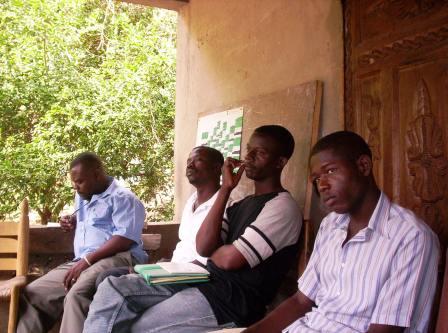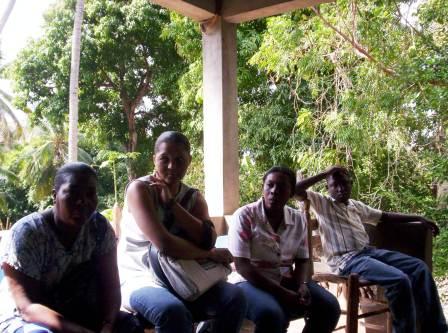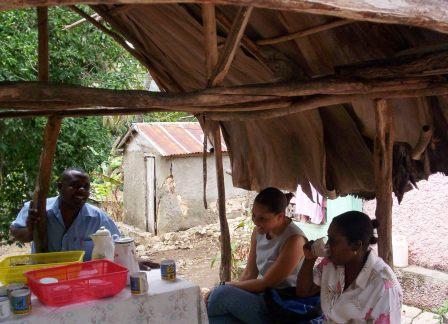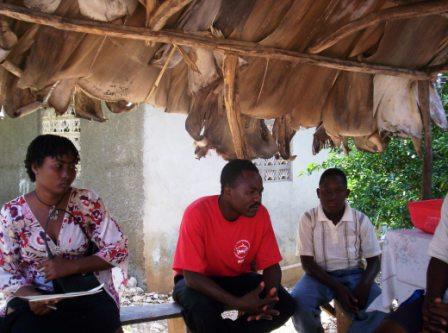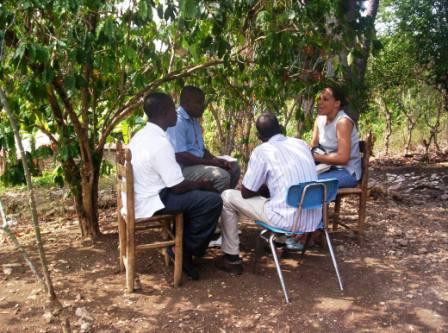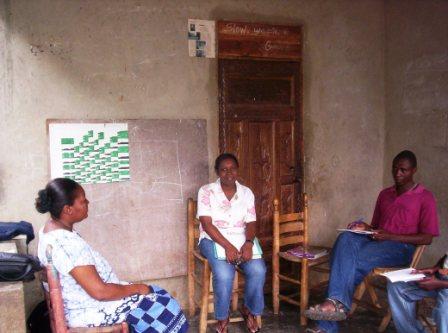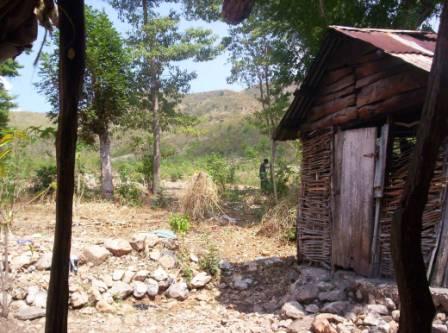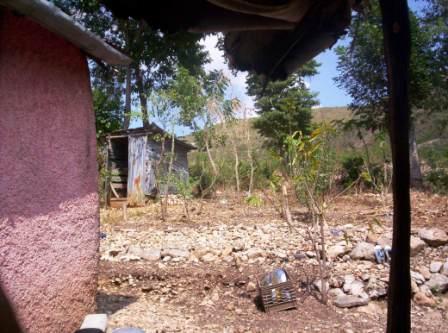I got to the American Consulate shortly before 9:00 AM. At 2:00 Lukha and I were still trying to secure the visa that we needed for him to visit Shimer with me in April. These were not hours of intense activity. We were waiting, just waiting. I was on the floor, because I didn’t want to stand up any longer and the benches were packed. Haiti’s not a place where one wants to whine, and I was sitting in air-conditioned comfort, but I wanted to be able to get home soon. I had a long trip planned for the following day, and I had a lot of reading to do.
For a combination of reasons, Lukha and I were in the part of the consulate where the interviews for visas were actually going on, so we could see who was getting approved and who rejected. Those who were approved would step over to a cashier and pay $5.00. That’s not much, but the interview itself costs $100.00. Very few get approved, and it was a striking scene.
I was trying to imagine what a parallel scene might be like in the United States: several hundred Americans who had paid a lot for the privilege of being packed into a small, bare space for hours, waiting to stand in a semi-enclosed cubicle and be interviewed briefly by someone who would only speak to them through thick glass and who would 19 times out of twenty swiftly deny them the request they came to make. It struck me that, in the States, such a scene would be spectacular. There would be yelling and cursing of all sorts. People would be demanding to see the next person up in the hierarchy. They would be arguing loudly and insistently. They would, as we say, “not take ‘no’ for an answer.” I was thinking of times when I had seen people at airports complaining bitterly, loudly, and sometimes foully about even minor inconveniences.
The scene at the Consulate was nothing like that. As each person’s request was denied, the request they spent a lot of money and a lot of time making, they quietly left and the next person stepped up, very likely to face the same fate. They left silently, quietly putting the documents they had brought in support of their request back in order, replacing them in the envelope or the folder or the briefcase they had brought them in. There were no loud complaints and there were no arguments. The one exception really just proved the rule: A German doctor was there with a patient for whom she had secured a six-month medical visa to visit Germany for treatment. Her patient needed an American transit visa for a two-hour layover at JFK, and it had been denied. She was furious, and was loudly and theatrically explaining to anyone who would listen how idiotic she thought the whole thing was. She phoned someone higher up — she was the only one in the waiting area talking on a phone; there were signs clearly forbidding it that she chose to ignore — and within five hours the decision had been reversed for her.
But she was not a Haitian. The Haitians who were there, without exception, quietly resigned themselves.
And that is what I found so striking. I was impressed by their dignity, and I mentioned that to Lukha. I told him that one generalization that I remembered Europeans I knew sometimes made about Americans was that we seemed a little childish to them in the sense that we seem to them to always expect that our dreams can come true. I asked Lukha whether he thought that something like that might be hidden behind the very different ways that Americans might react if they were set into the scene in front of us, and he had to agree.
But he also made an important point. If Haitians were showing their maturity by resigning themselves to the consuls’ decisions with dignity, then that maturity was not entirely a good thing. He pointed out that sometimes one should, perhaps, be ready to stand up and shout.
Lukha eventually got the visa, and I went my way, grumbling. I got a ride up to Petyonvil, and another to Malik, and then started the short walk from Malik to Ka Glo. I was struck by the number of people on the road, old and young, with gallon jugs in hand or five-gallon buckets on their heads, walking down the mountain from Ka Glo. I saw one medium-sized young man with two five-gallon buckets on his head, one stacked on top of the other. For several days, two of the major water sources in our area had stopped functioning. Problems in the pipes leading to them from the main source up the hill had caused them to be shut off, so people were walking to Ka Glo from as far as Dendenn, on the other side of Malik, to get water to drink and bath and cook and clean. They might have to walk almost an hour each way, and the triply heavy traffic at the source might mean more than an hour’s wait for their turn.
So Lukha and I had lost a day waiting to get a visa to visit the States, and folks on the mountain were losing their days getting the water they need to live. That helped put things in perspective.
The next day I went to Lagonav, and I returned two days later. There has been no rain on Lagonav in five months. Most rainwater cisterns are dry, and functioning water sources are few. I am told that it’s not unusual for someone to have to walk two hours each way for water, and, with the wait at the sources, that getting water is truly a day-long event. While on Lagonav I heard that there are areas so dry that, in order to get their donkeys to make the whole trip back from the water source, people light fires underneath them when they want to lie down.
I shared that story with Madanm Anténor, and she shuddered. I told her about how irritated I was by the wait for the visa, but how things looked different to me when I as forced to remember that I have neighbors with much more important concerns. When she heard about the donkeys, she proceeded to count her blessings, almost literally. She started to rattle-off all the things she could think off to be thankful for.
It made me think. Gratitude for the good things that are ours surely has its place, but what happens when that admirable gratitude interferes with anger or resentment that might move us to act? How many of the water issues, for example, could be managed effectively by a community that decided it could no longer accept the problems it faces every day? What would happen if the consuls knew that every visa denied would mean prolonged arguments and explanations?
